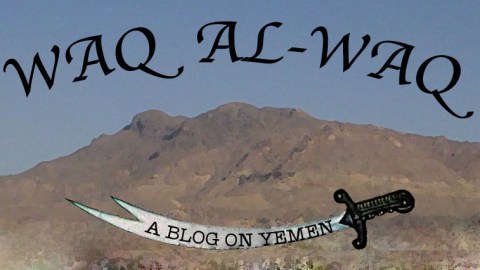Who’s Watching Yemen (Updated)

It seems I wasn’t the only one who took a month off. With the brutal crackdowns in Syria and the stunning events in Libya, Yemen has largely dropped out of the international news. But that doesn’t mean things aren’t happening.
For instance, did you know that Naji al-Zayadi, the governor of Marib, who five months ago survived being stabbed in the neck, today evaded what one newspaper called an “assassination attempt” (Ar.) by tribes in his home governorate. For the record, I don’t think it was an assassination attempt as much as it was a fight at which the governor was present.
But still things are happening, and so I thought it would be useful if Waq al-waq did a brief rundown of where things stand today in Yemen.
Stepping back, the big piece of news seems to be that Salih’s strategy is working. He is dragging the hoped for transition out, and the creaky alliance of anti-Salih actors is starting to break-down. This is particularly true when it comes to the north-south division.
This is both sad and predictable. Salih has been doing this for the past 33 years, and while the alliance held for several months, it now looks, at least from the outside, as if there are serious fissures that Salih can easily exploit, even from medical exile in Saudi Arabia.
This is why myself and other wanted to see the US lead – lead from the front not from behind, or wherever else it thinks it can lead from – and put much more pressure on Salih than it did, and do a much better job of convincing Saudi Arabia that its interests would be better served if Salih were eased out. But neither of those things happened, and instead the US let the GCC take the lead, and then was made to look foolish not once, not twice, but three times when Salih promised to sign the deal removing himself from power, and then at the 11th hour refused to do so.
I talked myself blue in the face (and I’m sure lost some friends) telling everyone how bad of an idea the GCC plan was and, in fact, continues to be – so it makes me a bit squeamish to see people still talking about it.
So in Yemen that leaves us with the military split between two factions.
1. Ahmad Ali: President Salih’s eldest son, he is effectively, through threat of force, controlling the Yemeni government. He commands the Republic Guard and Yemen’s Special Forces. His cousins, primarily Yahya and Ammar, who have both benefited significantly from massive amounts of US aid in recent years, are also backing him with their men from the Central Security Forces and National Security Bureau, respectively.
2. Ali Muhsin al-Ahmar, the elderly general and head of the 1st Armored division, he was Salih’s iron fist for most of the past three decades, until suddenly he wasn’t. Now he is the general largely in control of the defected soldiers. It should be noted that while he claims to support the popular uprising, few trust him, and no one save some Saudi princes wants to see him replace Salih.
This brings us the the key issue for the US: AQAP.
The US is continuing to use missiles and drone strikes in an attempt to keep AQAP off balance in southern Yemen. But I desperately hope that no one in the administration thinks air power alone will defeat this branch of al-Qaeda – and if they do they are sadly mistaken.
At best (and this is a default approach I strongly disagree with, and believe will have serious negative long-term consequences for the US) the idea of using air and drone strikes can only keep AQAP wrong-footed until the Yemeni military can move in and clean them up. But this isn’t happening.
And the reason it isn’t happening is because the Yemeni military is split.
One question I would like US policy makers to ask themselves is this: what incentive does either Ahmad Ali or Ali Muhsin have to take the fight to AQAP right now?
I’ll save you the suspense. The answer is not a lot. Why lose men, munitions and machines fighting AQAP, at a time when you need to be conserving all three for a civil war you are worried is just over the horizon?
Better to lose a province or two, goes the thinking, than the entire state.
And this is why I have such a problem with the US approach in Yemen. It is looking at the problem backwards. The AQAP problem isn’t going to get better until there is a political solution, and the longer this drags out the worse off Yemen will become.
But the US seems to think, or at least it acts, as if it can deal with AQAP independently of everything else in Yemen – and it can’t. I mean it can try, and apparently it is trying to do just that, but the US is not going to like the results.
Update: Some readers have written in to suggest that the above post ignores the roughly 100 brave Yemeni soldiers, who have died this year fighting al-Qaeda. They have a point. While my intention in the post was to make a broader political point, I didn’t mean to gloss over the sacrifices of the soldiers, who have been killed.
Still, my larger point, about both Ahmad Ali and Ali Muhsin lacking the incentive to fully take the fight to AQAP still, I believe, stands.





